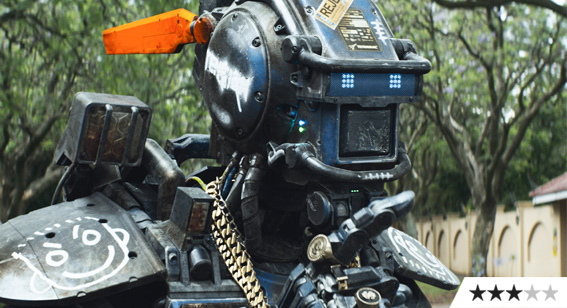Review: Chappie

Within the first five minutes of Chappie, director Neill Blomkamp has already borrowed extensively from his own scant two film career (and genre classic RoboCop) as a documentary-style introduction is followed by private policing robots rolling out onto the violent streets of Johannesburg. It’s so obvious that in anyone else’s hands it’d be called plagiarism, in Blomkamp’s “lazy-ism” may be a better description, one that infuses much of his film.
While Chappie’s opening is overly familiar, it’s not entirely unwelcome as it speeds the arrival of the film’s titular character, a clapped-out police robot saved from the scrapyard by engineer Deon (Dev Patel) and infused with computerised consciousness. As the infantile artificial intelligence falls into the hands of a gangster trio (2/3 of whom are Die Antwoord’s Yolandi Visser and Ninja, playing versions of themselves), Chappie begins to raise issues of nature vs nuture, the meaning of consciousness, the spectre of mortality and – thanks to Hugh Jackman’s amusingly macho Aussie rival of Deon’s – religion. Themes that are then cast aside towards the end of the film in favour of a violent showdown and resolution that are ultimately unsatisfying.
That’s not to say there aren’t good elements present. The robot Chappie is brought to life awesomely by actor Sharlto Copley and the boffins at WETA, and much of your tolerance for the film will hinge on whether you find Die Antwoord endearing or not. If, like me, you’re a fan, you’ll think they acquit themselves well and that their aesthetic is a welcome addition to the film’s otherwise familiar production design, props and wardrobes. But overall, Chappie doesn’t engage or challenge enough, and lacks too much in purpose to passionately recommend.
















